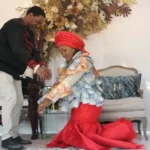The air in South Africa’s vibrant, multicultural churches is thick with tension. A storm is brewing within the Shona United Methodist Church (UMC), a congregation built on the shared faith and traditions of Zimbabwean emigrants, now deeply divided over the issue of LGBTQ+ inclusion. This division, a stark reflection of the global debate raging within the Methodist Church, has led to a dramatic split, leaving the future of the Shona UMC in South Africa uncertain.
The Johannesburg Shona UMC, established in 2008, has grown significantly over the years, boasting over 1000 members in Gauteng alone, with branches extending to other provinces. The congregation, built on a foundation of shared faith and cultural heritage, has acquired valuable property, a testament to its growth and influence. Now, however, this once-united community finds itself fractured, torn apart by differing interpretations of faith and scripture.
The catalyst for this division lies in the recent decision by the UMC’s General Conference (GC) in Charlotte, North Carolina, to allow the ordination of LGBTQ+ clergy and the solemnisation of same-sex marriages. This decision, a landmark shift in the church’s long-standing stance against homosexuality, has triggered a wave of dissent, particularly among conservative members, both in the US and across the globe.
“The truth is there has been some lying as some of the pastors and bishops want to protect their own interests like salaries and perks at the expense of people’s spirits,” a member of the breakaway faction, the Johannesburg North Methodist Church (JNMC), lamented. “We cannot continue being part of a church that sanctions such evils that go against the Bible. This is why Sodom and Gomorrah was destroyed.”
This sentiment, echoing the concerns of many conservative members, highlights the deep-seated anxieties surrounding the changing landscape of the church. For them, the GC’s decision represents a betrayal of their core beliefs, a violation of scripture and a threat to the very foundation of their faith.
However, the other faction, the long-standing Johannesburg United Methodist Church (JNUMC), remains steadfast in its commitment to the UMC, arguing that the GC’s decision does not necessitate a complete break.
“People are just being too emotional over the issue and acted in haste. They have not taken time to assimilate how the new order will work,” a member of the JNUMC stated. “God will always remain God whether the Americans make their own rules. We have always been African in our way of worship and that will not change. We all agree that we cannot have gay bishops and pastors in our African set-up and we will not compromise. We will have our own Book of Discipline that will not allow Africans to be part of this. It is unfortunate there has been politics at play and some members just capitalised on this to further their own agendas.”
This statement reflects the complex reality of the situation, highlighting the tension between upholding traditional values and embracing the evolving landscape of the church. The JNUMC, while acknowledging the cultural sensitivities surrounding LGBTQ+ issues in Africa, believes that the GC’s decision does not necessitate a complete break from the UMC. They argue for a more nuanced approach, one that allows for regional autonomy while maintaining a connection to the global Methodist community.
The debate surrounding the UMC’s decision has exposed a deep-seated divide within the church, highlighting the clash between traditional values and contemporary social realities. The Shona UMC, once a beacon of unity and shared faith, now finds itself at a crossroads, grappling with the challenges of reconciling tradition with change, faith with acceptance, and scripture with the evolving realities of the world.












